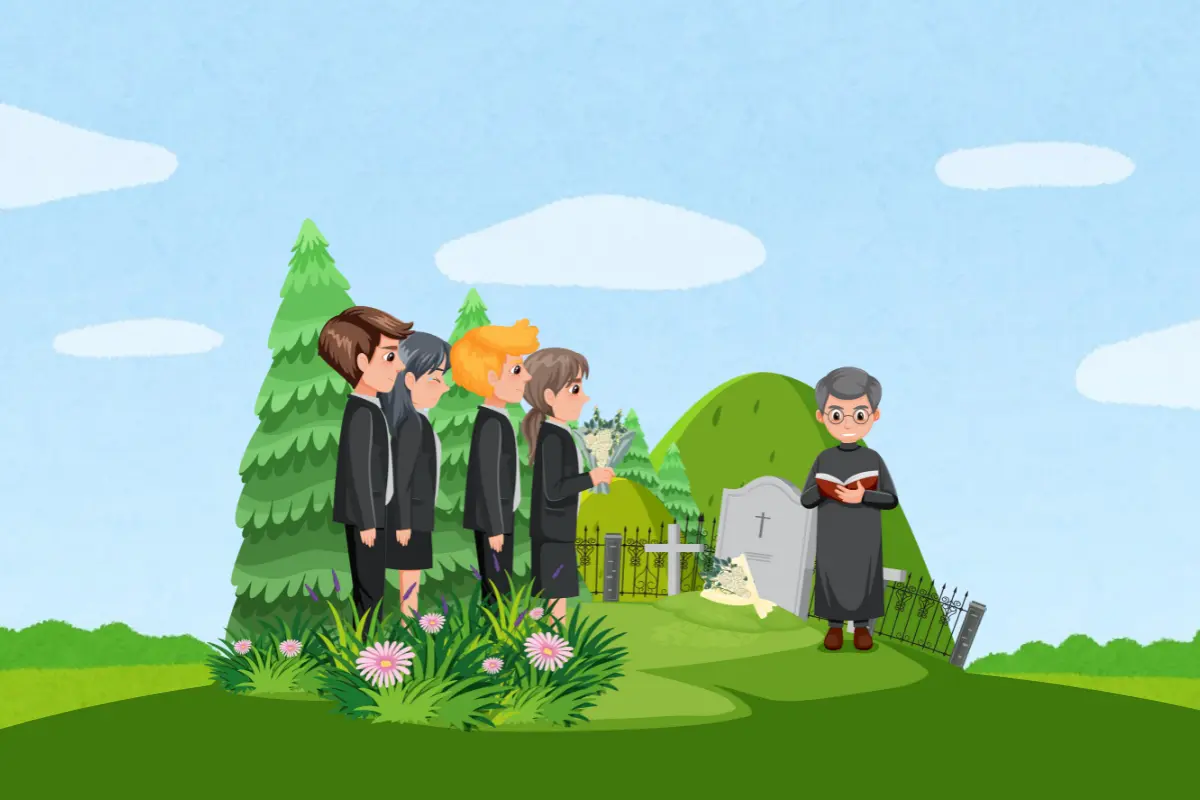How to Write a Eulogy: Complete Guide with Examples
In this article, you’ll discover how to write a heartfelt eulogy, with essential tips and examples to help you create a meaningful tribute. Start honoring your loved one today!

Murad Khan
Last updated on Sep 20th, 2024

When you click on affiliate links on QuillMuse.com and make a purchase, you won’t pay a penny more, but we’ll get a small commission—this helps us keep up with publishing valuable content on QuillMuse. Read More.
Table of Contents
Writing a eulogy is an emotional and significant task that allows you to commemorate a loved one’s life in a meaningful way. A eulogy serves as a tribute to the deceased, celebrating their legacy, sharing stories, and bringing comfort to those in mourning. This guide provides you with step-by-step advice, example structures, full-length examples, and tips to craft a heartfelt and memorable eulogy.
What Is a Eulogy?
A eulogy is a speech given at a funeral or memorial service to honor and remember someone who has passed away. It highlights their accomplishments, character, and the impact they had on others, offering a personal reflection of the deceased’s life.
A well-crafted eulogy not only celebrates the person’s achievements but also provides comfort and closure to family and friends during a difficult time.
How to Write a Eulogy
Writing a eulogy can seem daunting, but by following a systematic approach, you can create a heartfelt speech that honors your loved one. Here is a detailed guide on how to write a eulogy, from brainstorming ideas to delivering the final speech.
Understand the Role of a Eulogy
The first step is to recognize the purpose of a eulogy. It serves as a way to:
- Celebrate the deceased’s life: Share stories that illustrate their values, accomplishments, and personality.
- Provide comfort to the audience: Eulogies help those grieving by offering positive reflections on the deceased’s life, helping to focus on the joy they brought.
- Create a lasting memory: A good eulogy immortalizes the deceased’s legacy through thoughtful words.
When you start the process, remember that a eulogy is not just a summary of someone’s life but a heartfelt narrative that reflects on their impact.
Gather Memories and Information
Before writing, collect key details about the deceased’s life from family and friends. These details will help you form a complete picture and ensure that your eulogy resonates with the audience. Here are some things to consider gathering:
- Milestones: Important events in the person’s life, such as their birth, education, career achievements, marriage, and significant personal experiences.
- Hobbies and passions: What did they enjoy doing in their free time? Whether it was gardening, sports, art, or volunteering, these details add depth to your eulogy.
- Personality traits: Were they known for their humor, kindness, or determination? Describing their character makes the eulogy more personal.
- Relationships: How did they influence and interact with others? Focus on their family, friends, colleagues, and community.
- Legacy: Think about the long-term impact they left behind—whether in their profession, family, or community.
It’s helpful to speak with others close to the deceased, as they might have unique insights or special memories that you weren’t aware of.
Read more: Most Common Mistakes in Writing
Create an Outline
An outline will help you organize your thoughts and ensure your speech has a smooth flow. Structuring the eulogy around key themes will make it easier for the audience to follow. Here’s a breakdown of what to include:
1. Introduction
- Introduce yourself and explain your relationship with the deceased.
- Set the tone for the eulogy, acknowledging the solemnity of the moment while focusing on the purpose of celebrating the person’s life.
- You can start with a quote, a favorite saying of the deceased, or a brief anecdote that captures their essence.
2. Overview of Their Life
- Summarize the important milestones of the person’s life, such as where they were born, where they lived, their education, career, and family life.
- You can include key life events, achievements, or unique aspects of their life that are worth sharing.
For example: “John was born in 1950 in a small town, but his ambitions were anything but small. After graduating at the top of his class from [school], he went on to pursue his dream of becoming a doctor, helping thousands of patients over his 40-year career.”
3. Personal Stories and Memories
- Share personal stories that reflect the deceased’s personality and highlight their best qualities.
- Choose anecdotes that resonate with the audience—moments of kindness, humor, generosity, or wisdom.
- These stories provide a window into who the person truly was.
Example story: “One time, Helen took it upon herself to organize a surprise birthday party for a neighbor she barely knew. That was Helen—always looking out for others, even if they weren’t expecting it. She didn’t just help those close to her; she extended her kindness to everyone.”
4. Legacy and Impact
- Talk about the lasting impact the person had on their family, friends, and community.
- Mention any professional, personal, or community accomplishments that left a lasting impression.
- Discuss how their values, love, and teachings will continue to influence others.
For example: “Robert’s legacy is not just in the books he wrote or the career he had, but in the countless lives he touched with his wisdom, kindness, and generosity. His impact will be felt for generations to come.”
5. Conclusion
- End with a powerful closing that sums up the person’s life and provides closure for the audience.
- You might include a meaningful quote, poem, or reflection on what the person’s life meant to you and others.
- Offer final words of comfort, leaving the audience with positive and uplifting thoughts.
A sample conclusion might be: “While we may never fully understand why some lights dim too soon, we can take comfort in knowing that the light they brought into our lives will continue to shine. John will live on in our memories, our stories, and the love he shared with each of us.”
Read more: How to Write a Postcard
Example of Eulogy: For a Grandfather
Celebrating the Life of John Smith
Good afternoon, everyone. My name is [Your Name], and I’m John’s grandson. Today, I stand here deeply honored to celebrate the life of a man who meant the world to me and to many of you.
My grandfather was the embodiment of wisdom, kindness, and strength. He always knew the right thing to say at the right time and had an uncanny ability to make anyone feel heard and understood. Whether he was giving me advice about school or sharing stories about his childhood, he always made time for those he loved.
One of my favorite memories with Grandpa was when he taught me how to fish. We didn’t catch anything that day, but it didn’t matter to him. It was never about the fish—it was about spending time together, being patient, and enjoying the quiet moments.
Grandpa leaves behind a legacy of love, humility, and resilience. He showed us that life is not measured by the material things we leave behind, but by the impact we have on others. Though he is no longer with us, I know his spirit will continue to guide and inspire me, and all of us, for years to come.
Thank you.
Tips for Writing a Meaningful Eulogy
Keep the Audience in Mind
Consider who will be listening to the eulogy—family members, close friends, acquaintances, and community members. Your words should resonate with a wide range of people, so focus on stories and memories that are universal. Avoid inside jokes or overly personal anecdotes that only a few people would understand.
Balance Emotion With Positivity
It’s important to acknowledge the grief and loss everyone is feeling, but a eulogy should ultimately focus on the positive aspects of the person’s life. Share uplifting stories and memories to celebrate their achievements and the joy they brought to others.
Be Honest and Genuine
Authenticity is key. Speak from the heart and avoid overly polished language. A sincere, heartfelt message will have a greater impact than a perfectly written one. It’s okay to admit that writing the eulogy was difficult or emotional—it’s a relatable sentiment in such a situation.
Practice Your Delivery
Before delivering the eulogy, practice reading it out loud several times. Familiarity with the content will help you deliver the speech with confidence and reduce the likelihood of becoming overwhelmed by emotion during the service. Practicing also helps you identify sections where you might need to pause or slow down.
Examples of Eulogies

Here are some complete examples of eulogies to provide inspiration for your own speech.
Eulogy Example #1
A Loving Father and Husband
Good afternoon, everyone. My name is David, and I am honored to speak about my father, Richard. My father was many things—he was a loving husband, a dedicated father, and a loyal friend. He had a way of making everyone feel like they were the most important person in the room, and his kindness knew no bounds.
One of my fondest memories is how every Sunday morning, my dad would make pancakes for us. It didn’t matter how busy his week had been—Sunday mornings were sacred. It was his way of showing us that no matter what, family came first. He believed in the little things, and it’s those small moments that have stayed with me all these years.
Dad leaves behind a legacy of love and compassion. He was the kind of person who helped his neighbors without being asked, who treated everyone with respect, and who always found time for those he cared about. He made the world a better place just by being in it, and for that, we are forever grateful.
We will miss him dearly, but we know his spirit will live on in the hearts of everyone he touched. Thank you.
Eulogy Example #2
A Best Friend Gone Too Soon
Hello, everyone. My name is Sarah, and I have the privilege of talking about my best friend, Jessica. Jessica was full of life—she had an infectious laugh, a heart full of kindness, and an adventurous spirit that led her to explore every corner of the world.
We met in college, and from day one, I knew we were destined to be best friends. We did everything together—hiking trips, late-night study sessions, and even a road trip across the country. One memory I’ll never forget is when we got lost in the Grand Canyon. While I panicked, Jessica simply laughed and said, “We’ll figure it out, Sarah. It’s all part of the adventure.” And that’s how she lived her life—with grace, humor, and a sense of adventure.
Jessica left an indelible mark on everyone who knew her. She believed in living life to the fullest, in embracing every moment. Though she’s gone too soon, her legacy of joy, compassion, and love will live on in each of us.
Thank you.
Eulogy Example #3
A Community Leader and Mentor
Good morning, everyone. My name is Robert, and I am honored to speak today about my mentor, Helen. Helen was a pillar of our community, always striving to make the world a better place. She led with humility, grace, and an unwavering commitment to helping others.
Helen taught me that leadership isn’t about standing in the spotlight; it’s about lifting others up and empowering them to succeed. I remember when I was just starting my career, feeling lost and unsure of myself, Helen took the time to sit with me, offer guidance, and encourage me to keep pushing forward. She was my mentor, but more importantly, she was my friend.
Her impact on this community will never be forgotten. Whether it was through her tireless charity work or her mentorship of young professionals, Helen changed lives. Her legacy will continue in the countless people she inspired.
FAQs About Writing a Eulogy
What Should I Avoid When Writing a Eulogy?
Avoid focusing too much on sadness or personal grievances. While it’s important to acknowledge grief, a eulogy should be a celebration of life. Also, avoid too many inside jokes or overly specific anecdotes that only a few people will understand.
How Can I Stay Composed While Delivering the Eulogy?
It’s natural to feel emotional when delivering a eulogy. Practice several times in advance, and have a written copy to refer to during the speech. If you become overwhelmed, it’s okay to pause, take a deep breath, and continue when you’re ready.
How Long Should a Eulogy Be?
A typical eulogy is 5 to 10 minutes long, which translates to around 700-1,000 words. However, the length can vary depending on the number of stories you want to share and the complexity of the person’s life.
Conclusion: A Final Word on Writing a Eulogy
Writing a eulogy is a deeply personal and important task. It offers a chance to honor your loved one’s life, share special memories, and provide comfort to others who are grieving. By following the guidance in this article, you can create a thoughtful and memorable tribute that truly captures the essence of the person you’re celebrating.
Remember, a eulogy doesn’t need to be perfect—it needs to be heartfelt. Speak from the heart, and your words will resonate with those who hear them.
How we've reviewed this article
Our content is thoroughly researched and fact-checked using reputable sources. While we aim for precision, we encourage independent verification for complete confidence.
We keep our articles up-to-date regularly to ensure accuracy and relevance as new information becomes available.
- Current Version
- Sep 20th, 2024
- Sep 20th, 2024



